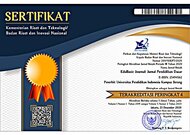The Effect of Self-Efficacy and Organizational Culture on The Public Elementary School Teachers’ Achievement Motivation
Abstract
Achievement motivation is an essential aspect that can encourage teachers to do things related to educational progress as best as possible. Teacher achievement motivation can be influenced by self-efficacy and organizational culture. High self-efficacy can increase teachers’ confidence in their abilities to be ready to face various things on their assignments. Besides, organizational culture is crucial for teachers to create a conducive work environment to feel comfortable doing their duties. This study aimed to determine to analyze the influence of self-efficacy and organizational culture on teacher achievement motivation. This study was conducted on public elementary school teachers in Kramatwatu Subdistrict, Serang Regency, with a population of 193 and a sample of 130 respondents using a simple random sampling method. The influence was measured by the correlation and regression formula. The multiple regression results showed the equation Y = 35.014+0.311X1+0.378X2+↋. It indicated that self-efficacy increased teacher achievement motivation by 0.311 units. It signified that simultaneously, self-efficacy and organizational culture influenced teacher achievement motivation, with a contribution of 11.3%. Based on these results, the education office, school, and other related parties need to make efforts to increase self-efficacy and organizational culture so that teacher achievement motivation can also increase.
Keywords
Full Text:
PDFReferences
Amir, H. (2016). Korelasi pengaruh faktor efikasi diri dan manajemen diri terhadap motivasi beprestasi pada mahasiswa pendidikan kimia Universitas Bengkulu. Manajer Pendidikan, 10(4), 336–342.
Dewi, A. P. A., & Ansyah, E. H. (2019) Hubungan antara efikasi diri dengan motivasi berprestasi pada mahasiswa yang bekerja. Proceeding National Conference Psikologi UMG 2018, 1(1), 103–110.
Hadiz, L. (2017). Dari MGDs ke SDGs: Memetik pelajaran dan menyiapkan langkah konkret. Bulletin SMERU, 2, 3–20.
Hanafi, A. S., Bahri, S., M., & Majid, S. A. (2019). Effect of organizational structure, job analysis and leadership style on work motivation and its impact on performance of employees. Journal of Public Administration Studies, 1(4), 39–45.
Hardianto, H. (2018). Pengaruh budaya organisasi, penghargaan, dan kepercayaan terhadap motivasi beprestasi pegawai dinas pendidikan dan olahraga Kabupaten Rokan Hulu. Jurnal Akuntabilitas Manjemen Pendidikan, 6(2), 193–202.
Kartomo, A. I., & Slameto, S. (2016). Evaluasi kinerja guru bersertifikasi. Kelola: Jurnal Manajemen Pendidikan, 3(2), 219–229.
Kusumawardani, L. (2018). Budaya organisasi dalam meningkatkan kinerja karyawan. BISMA (Bisnis Dan Manajemen), 2(2), 159–166.
Narotama, I., & Rustika, I. (2019). Peran harga diri dan efikasi diri terhadap social loafing pada mahasiswa preklinik Program Studi Sarjana Kedokteran dan Profesi Dokter Fakultas Kedokteran Universitas Udayana. Jurnal Psikologi Udayana, 6 (Edisi Khusus), 56–67.
Oktariani, O. (2018). Peranan self efficacy dalam meningkatkan prestasi belajar siswa. Jurnal Kognisi, 3(1), 45–54.
Putri, K. A. R. D. & Rustika, I. M. (2018). Peran kemandirian dan efikasi diri terhadap motivasi berprestasi pada siswa kelas unggulan SMA Dwijendra Denpasar. Jurnal Psikologi Udayana, 5(1), 12–22.
Tukilah, T. Mariah, S., & Pardimin, P. (2018). Kontribusi kompensasi, efikasi diri, dan budaya organisasi terhadap prestasi kerja guru SD. Media Manejemen Pendidikan, 1(2), 206–216.
Wahyuning, T., Ambarita, A. Riswandi R. (2016). Pengaruh budaya organisasi, komitmen, dan motivasi beprestasi terhadap profesionalisme guru. Jurnal Manajemen Mutu Pendidikan, 4(3), 1–15.
Wistarini, N., & Marheni, A. (2019). Peran dukungan sosial keluarga dan efikasi diri terhadap stres akademik mahasiswa baru Fakultas Kedokteran Universitas Udayana angkatan 2018. Jurnal Psikologi Udayana, 6 (Edisi Khusus), 164–173.
Pawitri, N., & Widiasavitri, P. (2019). Peran efikasi diri dan motivasi berprestasi terhadap kecenderungan kreativitas dalam menulis karya ilmiah pada siswa SMA yang menjadi anggota Kelompok Ilmiah Remaja (KIR) di Denpasar. Jurnal Psikologi Udayana, 6 (Edisi Khusus), 140–152.
Victoria, J. R., Matin, M., Rochanah, R., & Kemal, I. (2021). Pengaruh budaya organisasi dan komunikasi terhadap mutu layanan SMP Negeri di Kecamatan Pesanggrahan Jakarta Selatan. Visipena, 12(1), 1–16.
Yunita, R., Ambarita, A., & Karwan, D. H. (2018). Motivasi beprestasi guru SD Negeri Kecamatan Teluk Batung Selatan. Jurnal Manajemen Mutu Pendidikan, 6(1), 1–12.
Zamroni, E. (2018). Bimbingan dan konseling pada lembaga pendidikan anak usia dini. Indonesian Journal of Educational Counseling, 2(1), 31–42.
DOI: https://doi.org/10.17509/ebj.v3i1.31651
Refbacks
- There are currently no refbacks.
Copyright (c) 2021 Universitas Pendidikan Indonesia
This work is licensed under a Creative Commons Attribution 4.0 International License.
This journal is indexed by




.png)




.png)
1.png)


1.png)

.png)